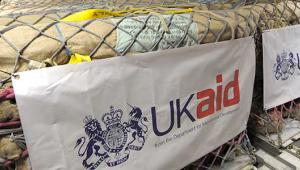The appointment of Patel to the Department for International Development had left many wondering about the status of the UK’s aid work and its commitment to spending 0.7% of its national income on overseas development. Patel had previously said that DFID was “low priority” and that it wasted funding.
Patel has also recently hired special advisor Robert Oxley, known for launching outspoken attacks on aid spending, raising hopes among hard-line aid critics that she might swiftly do away with the spending commitment when she took office.
However, she confirmed yesterday in an article for the UK’s Daily Mail newspaper that she would uphold the Conservative manifesto pledge on aid spending.
The article was published on Wednesday before Patel appeared in front of MPs on the International Development Select Committee that afternoon.
In the article, she wrote that too much UK aid is “stolen or wasted” and outlined a new direction for DFID based on an increased focus on economic development, trade and the British national interest.
But when challenged by the committee to put a figure on how much money she thought was being wasted, Patel struggled to provide a solid percentage.
“I don’t think we should focus on sum totals and binary figures,” she told Stephen Doughty, a Labour MP who repeatedly pushed her on the question. “This comes back to confidence from UK taxpayers that their money is being spent on need.”
Doughty retorted that building confidence could also mean not making “grand statements” without being able to back them up with statistics.
He also questioned Patel on previous comments that suggested she supported the death penalty. After continuous pressure from Doughty she stated clearly that this was not the case, and said she would continue DFID’s work against human rights abuses.
She said poverty reduction would remain the key focus of the UK’s £12bn aid budget and that humanitarian work would remain a core element of DFID’s business, lending vague support to the department’s focus on fragile states.
A new aid strategy published last year by the UK government committed 50% of DFID’s budget to fragile nations. However, it also stipulated that official aid funds would be spread across more government departments, from the Foreign Office to the Department of Business, Innovation and Skills and the Ministry of Defence.
Patel said the DFID would work closely and strategically with these departments, as well as others, such as the Department of International Trade, to capitalise on opportunities for trade deals in a post-Brexit world that served the national interest and grew economies overseas.
When questioned whether a focus on trade would divert DFID funds from aid, Patel said: “On trade the legislation is very clear. But that does not stop us from working across departments. I am very clear that post the EU referendum there are new, exciting opportunities and new partnerships that we can develop around the world that can strengthen our national interests.”
Patel stressed that DFID’s work is cross-departmental in nature, and put heavy emphasis on using its leadership and expertise, as well as its budget, for aid and development work.
She also, when questioned, guaranteed the continued existence of the aid agency after classing it as “low-priority” and calling for it to be abolished in 2013.
“I completely believe in the mission of my department. My department is incredible in the work that it does. So absolutely we will continue with gusto in terms of our humanitarian support and the way in which we work with partners around the world,” she said.
She did, however, say that under her leadership there would be a greater push to give taxpayers a better insight into how their money is spent, and promote the positive impact it has. She also pledged to drive change in the global aid system.
“There are good processes in place but we must always be challenging in terms of how we are spending that money,” Patel said.
She added that she will use DFID’s leadership role to “challenge, change and reform the global aid system, so that it seeks to deliver, yes, for the world’s poorest, but also British taxpayers as well”.













